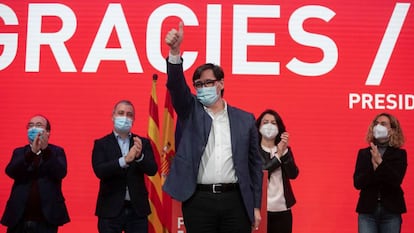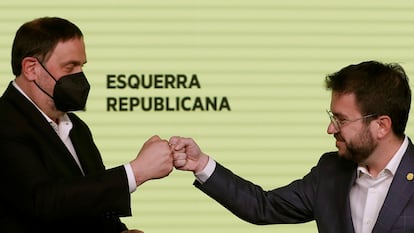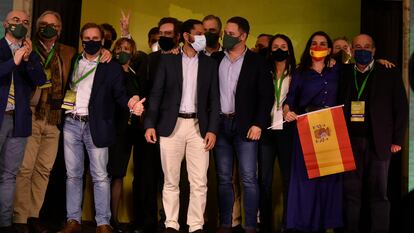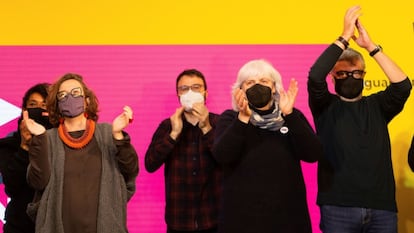Separatist parties win most seats in Catalan election, but Socialists secure the highest number of votes
The far-right Vox group has entered the regional parliament for the first time, winning 11 seats to become the fourth-largest political force

Neither the coronavirus pandemic nor the resulting economic downturn served to help predict what the Catalan political scene would look like after Sunday’s regional election. The polls, which saw low voter turnout due to the ongoing health crisis, saw the Catalan Socialist Party (PSC) victorious, with its candidate, former Health Minister Salvador Illa, taking the highest number of votes and 33 seats in the regional assembly. But it was not enough to defeat the pro-Catalan independence parties, who emerged from the vote in a stronger position.
The Catalan Repulican Left (ERC) party drew with the PSC and took home 33 votes, while Junts per Catalunya (Together for Catalunya) secured 32. With the support of the far-left, pro-independence party CUP, which managed nine seats in the regional parliament, the three parties will be able to repeat their previous pact and exceed the 68 votes needed for an absolute majority and thus form a government. Should such a deal be reached, however, the novelty will be that ERC will lead the coalition, rather than Junts.
PSC candidate Salvador Illa was chosen to run thanks to his high profile and voter approval after a year in charge of the central government’s response to the coronavirus pandemic. He managed to attract not just a good part of the anti-independence voters who opted for center-right Ciudadanos (Citizens) at the last regional polls in 2017, but also those who want to move on after 10 years of the pro-independence drive, which peaked in 2017 with an illegal referendum on secession from Spain and the passing of a unilateral declaration of independence in the regional parliament.

With 33 seats and 23% of the vote, the PSC secured its best result since 2006. ERC was close behind with the same number of seats and 21.3% of the vote. Its eternal rivals in the center-right, pro-independence area of the political spectrum, now together under the Junts per Catalunya brand, came in third with 32 seats and 20% of the votes.
Of particular note in last night’s results was the success of the far-right Vox, which is now the fourth-biggest group in the Catalan parliament – the party has seen similar success both on a regional and national level, and is currently the third-largest power in Spain’s lower house of parliament, the Congress of Deputies. Its result in Catalonia on Sunday makes it the principal reference point on the political right in terms of combating the independence drive.
After winning the most seats at the 2017 election, Ciudadanos saw its voter support crumble last night, taking just six seats – one of the biggest election disasters ever seen in Catalonia. The conservative Popular Party (PP), meanwhile, also lost seats and was left with just three – one fewer than its showing in 2017.
The Catalan branch of left-wing Podemos, En Comú Podem, held steady at Sunday’s vote and took eight seats once more. The anti-capitalist CUP party, meanwhile, secured its best result ever, with nine seats in parliament.
On the basis of these results, the pro-independence parties could form a government once more. But the PSC could also try to do a deal with En Comú Podem and ERC, thus forming a left-wing block – the central government in Madrid is a coalition of the Socialist Party (PSOE) and Podemos, and governs in a minority thanks to the support of a range of other groups, including ERC.

Should the pro-independence bloc do a deal, ERC would be in charge, taking over from Junts per Catalunya, which gained the most seats in 2017. That would let ERC set the agenda for the upcoming political term, moving it away from the unilateral approach to independence set out by Junts’ leader and former regional premier Carles Puigdemont. The latter politician continues to live in self-imposed exile in Brussels after fleeing Spain to avoid arrest in the wake of the 2017 secession attempt. The other leaders of the failed secessionist bid were tried in the Supreme Court for charges including sedition, and were eventually convicted and imprisoned. The ERC are in favor of reaching a cross-party pact in order to hold a legal vote on the region’s future within Spain.
A repeat edition of the outgoing administration will depend on whether Esquerra and Junts manage to agree on a common message in terms of independence. Junts has accused ERC of having abandoned the fight for independence after embracing more pragmatic political routes, while ERC has accused Junts of wanting to go after its goals without counting on sufficient support among the electorate.
For the first time on Sunday, the Catalan parties in favor of independence managed to secure more than 50% of the vote, but turnout was very low at just 54%. One of the secessionist parties, the Catalan European Democratic Party (PdeCAT), led by former regional premier Artur Mas, won no seats at all in Sunday’s elections, and the parties that did take seats have very different policies aside from the desire for an independent Catalonia.
What’s more, many of these parties have recognized that 50% of the vote is insufficient to declare independence, nor is it enough to reform the region’s Estatut, the laws that set out the governance of the northeastern territory. The reality is that the pro-independence parties managed to exceed 50% of the vote with 630,000 fewer votes than they secured at the 2017 elections, and with just the support of 26% of eligible voters.

The ERC candidate, Pere Aragonès, sent out a message to the central government after the results were in on Sunday. “It’s time to resolve the conflict, it’s time to sit down and see how we can resolve all of this with a referendum,” he said. The intention of ERC is to form a government not just with Junts and the CUP, but also with the support of En Comú Podem. “There is a clear majority of pro-independence and leftist deputies,” he said, after calling for a meeting of the forces that support an “amnesty” for the jailed leaders of the 2017 breakaway attempt, including his own colleague and former deputy premier Oriol Junqueras.
A majority of leftist parties seems to be a more complicated option. While the PSC, En Comú Podem and ERC have a clear majority, during the election campaign the latter party categorically stated it would not do any kind of deal with the Socialists.
The PSC’s candidate Salvador Illa insisted on Sunday night that he would stand at an investiture vote, despite not currently counting on the votes he would need to be confirmed as regional premier. The PSC is seeking to put a spotlight on its first win in many years at a Catalan election. Illa stated last night that “change is coming in Catalonia and there is no going back.”
Days and weeks of intense negotiations now lie ahead. If a deal can’t be reached with the pro-secessionist groups ERC will have to explore other options, but this will not be easy
Days and weeks of intense negotiations now lie ahead. The small, left-wing CUP will be a necessary force to form a pro-independence government, but they have not made things easy in the past – in 2015 they even managed to ensure that Artur Mas gave up on seeking a new term as regional premier, to be replaced by Carles Puigdemont.
If a deal can’t be reached with the pro-secessionist groups ERC will have to explore other options, but this will not be easy. The priority for each party will first be to ensure there is internal cohesion and then to consider deals with groups that they did not veto during the campaign – as the pro-independence parties did with the Socialists, for example.
The law sets out a 20-day period from now to constitute a new parliament. After that deadline has expired, the speaker will have 10 days to talk with the political forces and propose a candidate for the premiership. After that, an investiture debate will be held. A candidate will need an absolute majority to prosper in the first round of voting, and if this bid fails, a second round will take place 48 hours later where a simple majority is enough (more yes votes than no).
If no candidate is successful, more votes can take place during a two-month period, after which new elections would be called should no candidate be successful. This scenario nearly played out in 2015, until the CUP agreed to lend its support in exchange for the withdrawal of Artur Mas at the last minute.
The vote was defined by a very low turnout of less than 54%, even lower than the previous record set in 1992, back when longtime leader Jordi Pujol was winning back-to-back absolute majorities. Applications for mail-in ballots tripled from the previous election in 2017, according to the postal service. And a quarter of the 82,251 citizens who were randomly selected to man the voting stations requested to be excused from their duty, reflecting widespread fear about contracting the coronavirus.
Sunday’s election was the fourth held in the region since Mas began the pro-independence process in 2010. The polls were called eight months before the political term was due to expire after the previous regional premier, Quim Torra of Junts, was barred from office by the Supreme Court after being found guilty of disobedience. Torra had refused to remove political banners from public buildings during an election campaign, thus falling foul of electoral law.
As the main architect of the secessionist drive, Mas suffered a massive setback on Sunday. No longer having links to Junts and now supporting PDeCAT, he has gone from leading parties that won up to 62 seats in parliament to being wiped from the map in the Catalan parliament.
English version by Simon Hunter.
Tu suscripción se está usando en otro dispositivo
¿Quieres añadir otro usuario a tu suscripción?
Si continúas leyendo en este dispositivo, no se podrá leer en el otro.
FlechaTu suscripción se está usando en otro dispositivo y solo puedes acceder a EL PAÍS desde un dispositivo a la vez.
Si quieres compartir tu cuenta, cambia tu suscripción a la modalidad Premium, así podrás añadir otro usuario. Cada uno accederá con su propia cuenta de email, lo que os permitirá personalizar vuestra experiencia en EL PAÍS.
¿Tienes una suscripción de empresa? Accede aquí para contratar más cuentas.
En el caso de no saber quién está usando tu cuenta, te recomendamos cambiar tu contraseña aquí.
Si decides continuar compartiendo tu cuenta, este mensaje se mostrará en tu dispositivo y en el de la otra persona que está usando tu cuenta de forma indefinida, afectando a tu experiencia de lectura. Puedes consultar aquí los términos y condiciones de la suscripción digital.








































